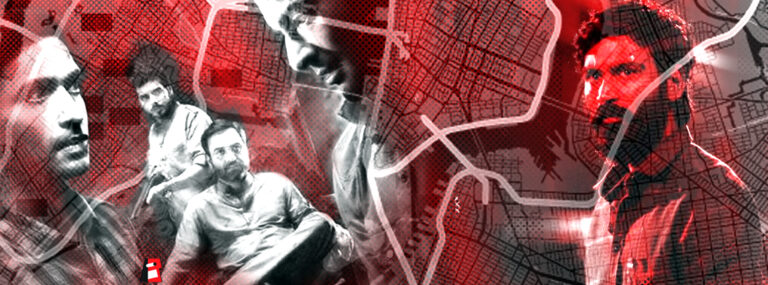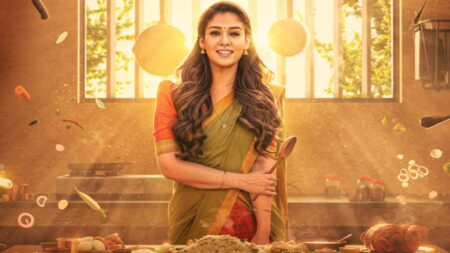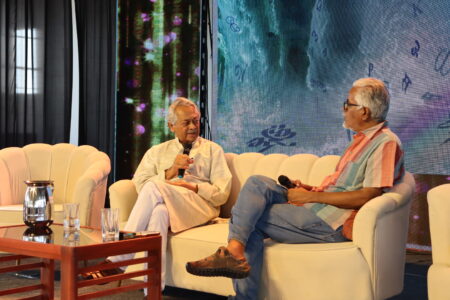Mirzapur and Vada Chennai track the life and career of men and women condemned to be prisoners of their own geography
“Geography is destiny.” You will come across this phrase in the every second book and third film that talk about geopolitics. Most recently, we heard it in Amazon Prime’s swashbuckling thriller series Jack Ryan. Somewhere towards the end of the series, thus speaks a human trafficker from the Middle East when the suave, judicious Jack Ryan pooh-poohs his line of (bad) work: “Maybe if I was born in a nice city.. I could be the good guy, too. Geography is destiny, my friend. The world is the kiln, we are the clay.” Translate the lines into Hindi or Tamil and let Vikrant Massey (Bablu in Mirzapur, the latest Indian web series on Amazon Prime) or Dhanush (Anpu in Vada Chennai, a Tamil film released recently) mouth them nicely and strongly, they will jell perfectly into the story and plot.
Both the cinematic works are an exploration into the geography as much as they are into the minds and matters of the people that populate these landmasses. Mirzapur stars Pankaj Tripathi, Ali Fazal, Vikrant Massey, Shweta Tripathi, Shriya Pilgaonkar and Kulbhushan Kharbanda while Vada Chennai has an ensemble cast of Dhanush, Radha Ravi, Daniel Balaji, Samuthirakani, Andrea Jeremiah, Aishwarya Rajesh and more. Evidently, both films find their core genes in geography. Mirzapur tracks the gun-wielding underworld of Central Uttar Pradesh, profiling the dark contours of some men and women who inhabit it. Vada Chennai, as the name suggests, is set in the sea salt-smeared environs of North Chennai where director Vetrimaaran follows a group of machet-happy gangsters in a battle for survival and beyond.
Land and mass
Mirzapur closely follows its protagonists, in clutter-free linearity and tries to be honest to the lives and actions of its characters — from the nonchalant mafia don Akhandanand Tripathi aka Kaleen Bhaiya to vily politician JP Yadav and the fallen heroes of Guddu and Bablu Pandit. Interestingly, Bablu, the most sensible of the duo, knows he has no future in Mirzapur, a town where finding proper, ethical employment is nonexistent considering the stark ground realities existing in their town and beyond. Or so he thinks. Hence he wants to go to Lucknow or somewhere closer to the big city where he thinks he could build a different future, may be in civil services. But the geography becomes a villain in his life, endangering everything he gets into contact with, including his family. Mirzapur happens in his life at this critical juncture, in all its abnormalities and monstrosity and it penetrates his being like the creepy many-legged paranormal creature swallows up the nervous systems of Will Byers in Netflix horror sensation, Stranger Things.
Much the same goes for almost all the characters in Vada Chennai, where the complex landscape of North Chennai is the raison d’etre as well as the brutal propelling force of their miserable but simpleton lives. All the deadly, remorseless gangsters who rule the seaside slums of North Chennai, building a chaotic and cobwebbed empire of smuggling, end up six feet under thanks to actions that start and end in the very landscape they belong to, North Chennai. And they are not on the run, they cannot. They are condemned to their curious existences. Philosopher Jean Paul Sartre said that “Man is condemned to be free”. In Vada Chennai, the landscape takes the place of the man in Sartre’s maxim.
In a way, all these characters are prisoners of their geographies. They are stuck there forever. It is land-warp, like a time warp. Their Pavlovian response to any efforts either from government authorities or from third parties to ‘relocate’ or ‘reform’ them, a euphemism capitalist forces use to claim their territories and monetise their resources, are met with stiff resistance. There is no ‘win-win’ in this race of resistance, instead everybody pays at the end, in cash or kind. Anpu (Dhanush) does not know if he has a future elsewhere and firmly believes life in his ghetto/slum is the best hope of a shiny day he has and holds on to it like a baby to his mother and fights for his right to be there and meets his rivals forces in that desperate endeavour.
Similarly, Guddu and Bablu of Mirzapur know they are caught in the meaningless, formless fulcrum that is Mirzapur where guns, goons and gore (the 3G of a typical Central UP town) rule the roost. As journalists covering Uttar Pradesh tell us, the land is known for its disturbingly low levels of literacy and human development indices and history shows how and why the region has become a hotbed of a curious kind of civil militancy, smeared in politics, pelf and religious power.
No winners
Bablu ends up in the gun business and becomes part and parcel of a system his father, a righteous lawyer, has been fighting and that life takes him to geographies that make matters worse for him and his wide-eyed ambitious brother Guddu. Mirzapur becomes a dangerous obsession for them. They want to run it, perhaps, the way the don, Kaleen, has been running it. They even name their vehicle ‘the Lions of Mirzapur’, which acts as a reaffirmation of their quest to be the ones that control their geography. But the geography takes it all back from them. In the bloody end, the only ‘character’ that actually stands tall, unhurt is Mirzapur.
The climax of Vada Chennai Part 1 echoes similar sentiments. In the bloody battles of kinships and convoluted personalities, what remains in the land and the many claims on it and the many other battles that would come to win the war that would ultimately engulf and claim the geography. The winner doesn’t take it all in the Vetrimaaran film. Instead, it (geography) takes the winner. In fact, much of the bad press Mirzapur has received just after its release, most of which looked suitably paid, has got a lot to do with the fact that more than anything else the webseries holds a mirror to the ground realities of Uttar Pradesh, which may not necessarily goes in sync with the image of the State Yogi Adityanath’s public relations department has been aggressively pushing of late.




